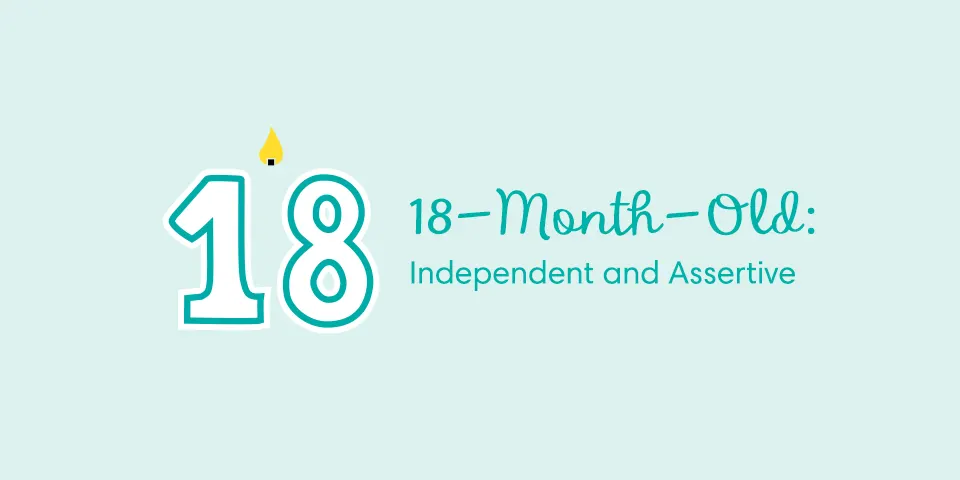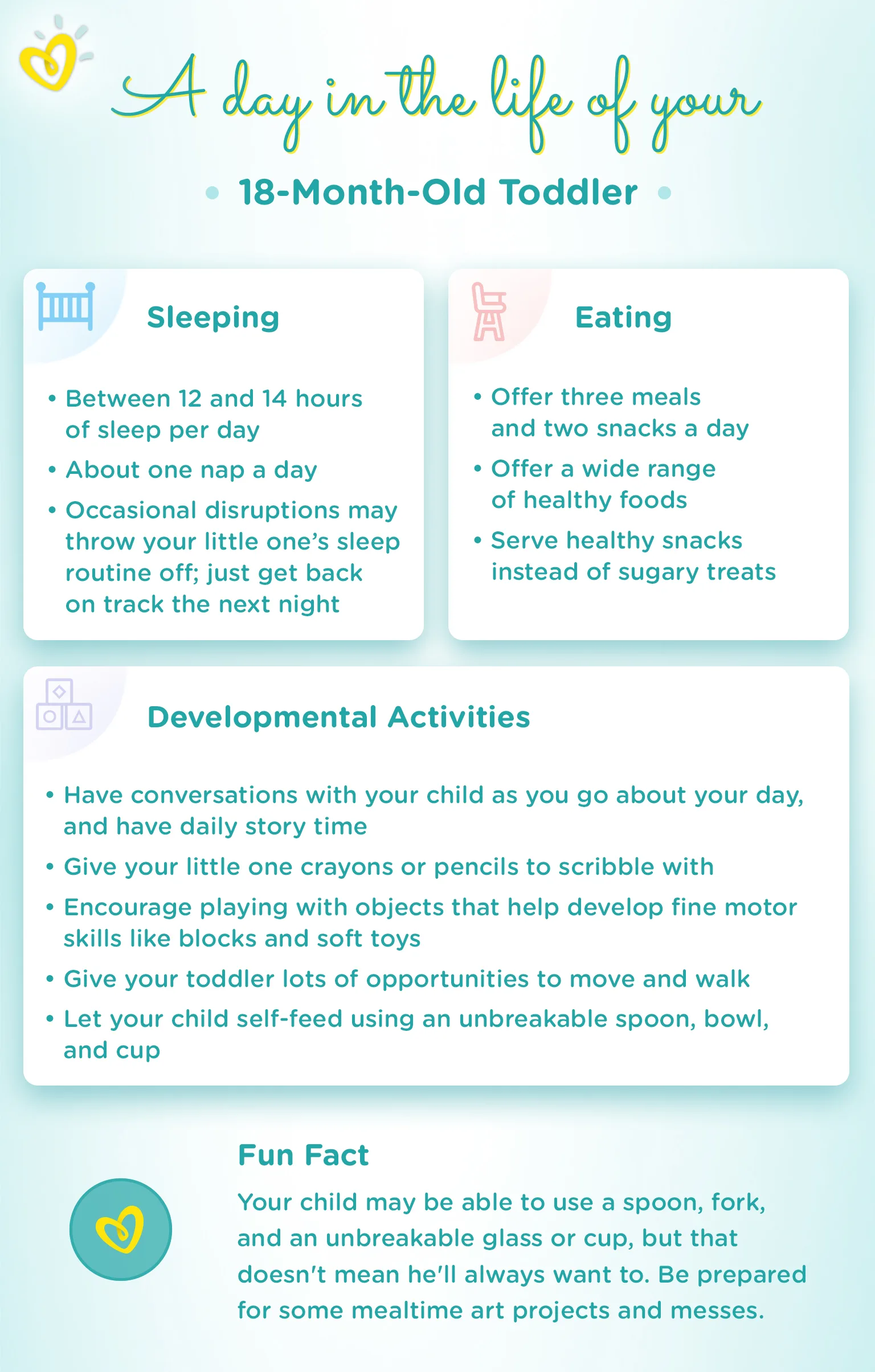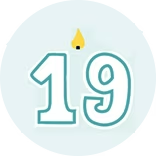18-Month-Old Baby Milestones
At around 18 months, toddlers become more and more independent and a little feisty, too. Now, you may have noticed your 18-month-old saying “no” more often to something you ask him to do. He would have gotten better at climbing and getting down the stairs and at coordinating his hands and fingers.
Know what else is in store now that your little one is one and a half years old by reading below. This article will also help you with some developmental insights and advice for this month.
18-month Baby Milestones
As every child is unique and develops at his own rate, your toddler may reach these 18-month-old milestones either this month or a little earlier or later:
Declarations of independence:
Around this time, your toddler may be getting more independent and assertive. As he gains confidence, he may start saying “no” when you ask him to do something he doesn’t want to do. It may even become his new favourite word, so watch out!
Confident stair climbing:
Up until this point, getting up and down stairs might have been tricky for your little one, but it may be getting easier now as he learns to climb stairs while holding onto the railing. Around this time, he may also be able to turn corners without falling. Make sure that you supervise him when he's around stairs.
Increased self-awareness:
At around 18 months old, your toddler may be more self-aware. He may be able to say his own name, identify himself when peering into a mirror, and generally be more interested in self-care activities like combing his hair. How exciting to see your little one starting to grow up in this way!
Here’s how you can support your 18-Months Baby’s Development
These are some ways you can help support your 18-month-old’s development. Here's a small 18-month-old development checklist that you can follow:
Encourage activities that improve hand and finger skills:
Around this time, your little one may pick up small objects and move them around with control. For example, he may be able to put the pieces of a wooden peg puzzle in place, scribble with a pencil, finger-paint, build basic towers with toy blocks, and more. Provide plenty of opportunities to do arts and crafts, which will allow him to express his creative side as well as boost his fine motor skills.
Play with your toddler:
Try a game of hide-and-seek or toss or roll a ball back and forth. He may want to bring you a toy and tell you what to do with it; let him be the director. Given your child is at the stage where he will want to explore, keep an extra-close eye on your toddler and ensure your home is babyproofed.
Take your child on outings:
Trips to the neighbourhood playground or park provide opportunities for your child to explore and play and to work off some of that manic toddler energy. If you have more time, consider heading to a children's museum or the zoo. Even riding the escalator or a glass-enclosed elevator in a shopping mall or a hotel is entertaining for an 18-month-old.
Get ready for potty training:
Typically, experts recommend potty training start after the second birthday, but some toddlers might be ready earlier. You can begin saying the words pee-pee and poop when you change your little one’s diaper, and help him become familiar with the toilet or the potty, perhaps by letting him help choose a potty chair and leaving it out for him to see.
Make up a story:
Find a picture book that has few or no words and help your 18-month-old make up a story. To get him going, ask questions about what he sees: Are there any people? What are they doing? What kind of scenery is there? You could encourage him to use a funny voice or facial expression for each character, too, as he "reads" his story. You and your toddler are on an imaginative journey—and he's also getting a big boost in language comprehension and vocabulary.
Mealtimes and Menus for Your 18-Month-Old
You may be noticing that your toddler’s eating habits are quite unpredictable. One day, he may eat everything in sight, and the next he may turn down anything you offer him, even a food that was his favourite. It might give you peace of mind to know that your toddler is not unique in this behaviour. Most toddlers around this age have fluctuations in how hungry they are depending on things like their level of activity that day, their metabolism, and whether they are in the middle of a growth spurt.
Most children do well with three small meals and two snacks per day. Serve a variety of nutritious foods and let your child decide what and how much of it to eat. You'll find that over the course of a few days his diet will naturally balance itself out so that he gets all the nutrients he needs.
Using a spoon, fork, and a cup is one of the 18-month-old baby milestones for your toddler this month. Although he may be comfortable using them, he might not always want to eat with them because for him, playing with his food might be more entertaining. So, be prepared for this type of behaviour when it comes to mealtime.
Limiting Sweets
It’s natural for your little one to be inclined toward sweets more than other foods. He may have gobbled up sweet options like carrots or sweet potatoes when you used to feed him baby foods. At around 18 months, he is most likely to pick a cookie over a piece of cheese when offered.
Remember, as a parent, you control the types of food served to your toddler. So, be sure to encourage healthy choices while limiting his intake of sugary food. If he is throwing tantrums to eat dinner, do not be tempted to allow him to eat sweets in order to have him eat something. 18-Month-Old Toddler
Sleep Schedule
At 18 months old, your toddler typically requires between 12 and 14 hours of sleep a day. Included in this number is about one nap per day, too.
If your toddler is in day-care, the facility often has one or two nap times scheduled each day. You may want to check in with the day-care staff to find out how well your child is napping. If you notice he’s overtired when you pick him up from day-care, it could be because these nap times are not productive. Ask the staff what could be done to improve the situation and how to better coordinate your toddler's sleep routine at home and at the day-care facility.
A Day in the Life of Your Toddler
Here’s a snapshot of what your one-and-a-half-year-old’s day might look like:
Your Toddler’s Health and Safety: In-Flight Safety
You might be planning to travel by plane with your 18-month-old, whether it’s to visit family who live faraway or for a vacation. Here are some tips to take into consideration when flying with your toddler:
Offer your child a pacifier to suck on during ascent and descent, which can help equalise the pressure in her ears and help prevent discomfort.
Think about protecting your child’s ears from cabin noise with small earplugs or cotton balls. Noise-cancelling headphones, if she can tolerate them on her head, can also work well.
Choose a seat closer to the window, as an aisle seat can put your child at risk of getting bumped by a food service cart or by someone walking in the aisle.
Dress your child in layers that are easy to remove, as the temperature on your flight can vary.
Consider a diaper change before you board the airplane and be sure to pack plenty of supplies in your diaper bag for the journey.
Bring items that can help occupy your child’s attention, such as her favourite stuffed animal or blanket, books, and toys.
FREQUENTLY ASKED QUESTIONS
During this month, or sometime soon, your toddler may be able to do things like:
• Scribble and draw
• Follow simple instructions that you give to her
• Point to familiar objects that you name
• Speak using simple phrases
• Sort shapes and colours.
Development Tips for Your Toddler This Month Check out the following tips and advice to help support your 18-month-old toddler’s development:
Pay attention to your toddler's moods and rhythms. Each 18-month-old is unique and has their own personality. Be responsive in ways that support your toddler's temperament and praise them for good behavior.
Offer warm physical touch. Showing your affection by hugging and cuddling builds your toddler’s sense of security. Time flies, so take advantage of every chance to get close to your little one.
Encourage your child’s speech development. Toddlers can have difficulty communicating since their vocabulary is still growing and expanding. You can help your 18-month-old reach appropriate speech and language milestones by introducing them to new words and expressions through reading and speech. If you think your toddler is experiencing a speech delay or not talking, consult their healthcare provider.
Establish routines. Make every day consistent and predictable for your child. Children benefit from sticking to a routine, such as having meals at the same time every day and following a bedtime routine for winding down at the end of the day. If for some reason you can’t follow the usual routine on a certain day, just get things back to “normal” as soon as you can.
Items You Will Need This Month Here are some baby gear items and supplies that may come in handy this month:
Toddler car seat. You may be spending a fair amount of time in the car, whether it's for errands, family visits, or longer trips. Ensure your current car safety seat is safe and appropriate for your toddler's size and age. Your child should travel in a rear-facing car seat until they reach the highest height or weight limit of the car seat.
Toys. Items that foster cognitive development and imaginative play can be some of the best toys for an 18-month-old. Look for beginner jigsaw puzzles, board books, and toys that encourage make-believe, like a child’s kitchen or a lawnmower that blows bubbles.
Sunscreen. Check that you have enough sunscreen at home and, if not, add it to your shopping list, as you may go through it more quickly than you think. You should apply a sunscreen of SPF 30 or more to your child before they head outside, and then reapply it every two hours.
Child-proof cabinet locks. Given your child is at the stage where they’ll want to explore, keep an extra-close eye on your toddler and ensure your home is babyproofed. Use cabinet locks to keep cupboards off limits and think about always locking certain doors, such as the ones to the garage, laundry room, and basement.
Diapers, wipes, and diaper rash cream. These are items you don't want to run out of, so keep a good supply on hand.
Your Life as a Parent: Setting a Good Example
You may soon notice your toddler trying to imitate you and your partner day by day. Whether you are talking on the phone or driving the car, she’ll try to do the same by talking on her toy phone or driving her toy car. As she becomes more inclined to imitate you, make sure you are on your best behaviour so that you can set a good example.
You can try the following ways to set a good example for your toddler:
When you or your partner share something with each other, speak it out to your child, by saying something like, “Dad is sharing his piece of cookie with Mom. That’s really nice of him, isn’t it?”
When you’re feeling frustrated, let your child know that you’re frustrated and then show her how you calm down.
Always try to express your feelings, as these moments will help teach your child know that it’s OK to express her own feelings to you.
Praise your child on a better behaviour; for example, if she puts all her toys in the box, say “Good job!”
Checklist for This Month
□ Schedule and go to the 18-month checkup. Your toddler’s 18-month appointment is an important one, as there’s so much going on. This is a good opportunity to raise any questions like “How many words ‘should’ an 18-month-old say” or “How much ‘should’ an 18-month-old weigh.” So come prepared with a list to get all the answers at the checkup. At this visit, your child’s provider will check your 18-month-old’s overall growth, weight, and height; do a physical exam; and order any tests and provide any vaccines that your child may need. Your provider will go over common issues at this stage of development, which could include diet, discipline, and sleep.
□ Schedule a trip to the dentist. If you haven’t already done so, schedule your toddler’s next dental visit. It’s a good idea to have regular checkups every six months, unless your child’s dentist or healthcare provider recommends otherwise. At the visit, the dentist will make sure your toddler’s teeth are coming in and developing in a healthy way and may give you personalized advice on dental hygiene. Seeing a pediatric dentist is recommended by the American Academy of Pediatric Dentistry (AAPD), but if that’s not possible, look for a general dentist who has experience with children.
□ Start a scrapbook. As your toddler does more arts and crafts activities, like drawing, finger-painting, or simply scribbling with crayons or colored pencils, it might be time to start a scrapbook to save some of the artwork.





